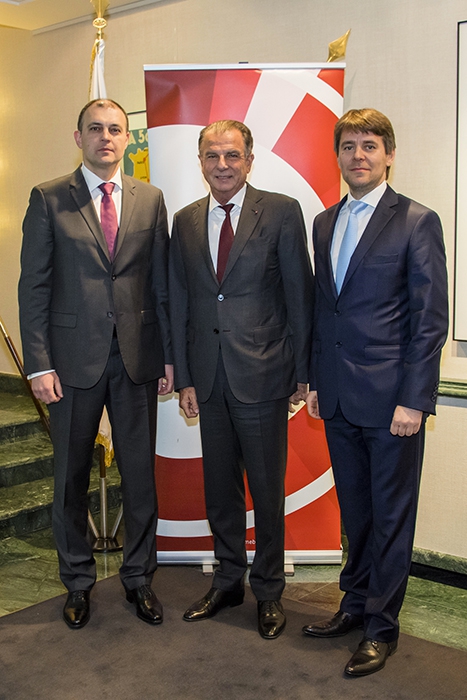Ambassadors Conference: spotlight on Slovakia and Moldova
It was an unprecedented proposition: a conference to learn more about not one but two countries attended by their Ambassadors. H.E. Marek Eštok for Slovakia and H.E. Lilian Moraru for Moldova took turns to present their countries attributes. The MEB will be accompanying official visits by HSH Prince Albert II to both these destinations at the beginning of May.
Some 50 entrepreneurs from the Principality attended the conference, along with Ambassadors, diplomats and economic players who were there as part of their preparations for the Prince’s trip.
Independent since 1993 following the dissolution of Czechoslovakia, Slovakia has been a European Union member since 2004. It is part of the Schengen area and has adopted the Euro. With GDP growth remaining steady since 2010, the European Commission forecasts +3.2% for 2017 and +3.8% in 2018. This healthy state of affairs is supported by high productivity, a modern industrial system and a disciplined, inexpensive and highly qualified workforce. The flagship automobile sector is world leader in terms of number of vehicles produced per capita, and equipment manufacturer, Monaco-based Mecaplast, has a new factory unit in Slovakia that will create 300 jobs by 2019. Other key sectors cited by Mr Eštok are ITC, consumer electronic goods and R&D.
The Principality and Slovakia are celebrating ten years of diplomatic relations between the two countries. In 2015, at the inauguration of the Slovakian Consulate in Monaco, the Monaco Economic Board (MEB) signed a cooperation agreement with the Slovakian Chamber of Commerce and Industry, presided by Mr Peter Mihok, also President of the World Chambers Federation. These contacts will prove invaluable for the MEB’s Trade Mission to Bratislava set for 1 to 3 May this year.
Another young nation, Moldova came to being in 1991 following the break-up of the USSR. Located on the borders of the EU, it is a Francophonie member and shares many cultural traits with Romania. After a financial crisis in 2015, the country reacted quickly and remains open to foreign investors, with seven very attractive Free Economic Zones. Agriculture remains a key sector (fruit and vegetables represent 25% of exports) and is moving towards organic production. Little known in the West, Moldovan wine is famous in Eastern Europe; the country has the largest cellar in the world (200km of tunnels!). Manufacturing is also an important sector, particularly textiles due to a low-cost workforce and an expertise that has already attracted the big labels. New technologies are an emerging sector, supported by a government that is very proactive in this area.
Since 2014 Moldova has had an Honorary Consul in Monaco and HSH Prince Albert II’s trip will further strengthen relations between the two countries. The MEB is part of the delegation and will take the opportunity to sign a cooperation agreement to ensure they have a full hand to support Monaco companies wanting to expand there.
Photo caption: Left-right - H.E. Lilian Moraru, Moldova Ambassador for Monaco; Michel Dotta, Chairman Monaco Economic Board; H.E. Marek Eštok Slovakia Ambassador in Monaco.

